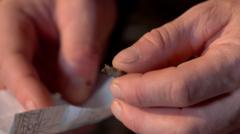The sentencing of Oscar Jenkins to 13 years in a prison for participating in armed conflict as a mercenary has sparked diplomatic tensions, highlighting the legal risks and geopolitical implications of foreign involvement in the Ukraine war.**
Australian Teacher Sentenced to 13 Years in Russian-Occupied Court for Fighting in Ukraine**

Australian Teacher Sentenced to 13 Years in Russian-Occupied Court for Fighting in Ukraine**
Oscar Jenkins, an Australian citizen captured while fighting alongside Ukrainian forces, has been sentenced to a lengthy prison term in a Russian-controlled court, raising concerns over the status of foreign fighters in the ongoing conflict.**
An Australian teacher, Oscar Jenkins, aged 33, has been sentenced to 13 years in a maximum-security prison by prosecutors in a Russian-installed court in Luhansk, a region under Russian control in eastern Ukraine. Captured last December, Jenkins was found guilty of fighting in an armed conflict as a mercenary. According to prosecutors, he arrived in Ukraine in February 2024 and was allegedly compensated between 600,000 and 800,000 rubles (approximately £5,504 to £7,339) per month for his role in military operations against Russian combatants.
In December, alarming footage emerged showing Jenkins bound and being assaulted by Russian forces while being interrogated about his involvement in the conflict. Following his capture, Australia’s diplomatic efforts included summoning the Russian ambassador to address false claims about Jenkins's death. The Australian government has continuously demanded his release, with Prime Minister Anthony Albanese emphasizing a commitment to advocate for Jenkins against the Russian regime.
This case comes against the backdrop of similar judicial actions taken by Russia against foreign nationals fighting for Ukraine; for instance, British citizen James Scott Rhys Anderson was sentenced to 19 years on terrorism and mercenary activity charges earlier this year. These developments underscore the precarious legal circumstances surrounding foreign fighters involved in the ongoing conflict and the complex international relations at play, especially regarding the acknowledgment of sovereignty and conflict participation rights since Russia's recognition of Luhansk and Donetsk as independent territories in early 2022.




















